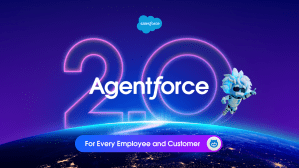Editor’s Note: AI Cloud, Einstein GPT, and other cloud GPT products are now Einstein. For the latest on Salesforce Einstein, go here.
2023 is proving to be another complex year for businesses. Macro market headwinds, high inflation, and sustained uncertainty remain.
In my conversations with business leaders across EMEA, however, digital transformation remains firmly at the top of the CEO agenda.
Each CEO I speak with recognizes that the speed of digital innovation is accelerating. And they understand the need for a digital strategy that builds resilience by driving greater efficiency and productivity.
They also understand the importance of having a transformative vision for the future. As industries adopt technology such as generative AI, it is critical that leaders enable their companies to keep pace with new innovation and the shifting expectations of their customers. Their long-term success depends on it.
Business ecosystems: Powering better banking
This can be seen in many industries, including financial services, where more people today are choosing to bank online and demand a seamless experience across everything from mobile apps to websites to virtual chats. In fact, the number of digital banking users is expected to exceed 3.6 billion globally by 2024.
Yet many large enterprise banks struggle to meet these customer expectations — less than 20% of customers across banking, insurance, and wealth management feel they receive the assistance they need when speaking to customer support. It’s a sector-wide tension that has prompted incredible innovation through the rise of a new breed of digital-first banks. Last year, 43 new challenger banks entered the global marketplace.
Built in the cloud, these app-first brands have been able to bypass the legacy systems and costs of traditional banking models to offer customers a service that is quick, easy, and fiercely value-driven. All in one place, on a phone.
Enterprise banks too have an opportunity to use technology to connect the full range of services that they and their partners offer. By positioning these services at the heart of a business ecosystem, they can create competitive advantage over the sector’s newer brands. Standard Bank Group is a great example. With the right digital innovation and strategy, this 160-year-old banking institution is fully networking its services and partnerships across markets to enhance its customer offer.
Our extended agreement with Salesforce is a major step towards transforming the Standard Bank Group into a client-centered platform business that delivers a range of individualized, instantly available solutions, services and opportunities, enabled by modern digital technologies and delivered in whatever way a client prefers. Our goal is to use our data capabilities to build deeper, better and more enduring relationships with our clients.
Standard Bank Group CEO, Sim TshabalaLA
Connected cars: Helping the automotive industry shift gears
Business ecosystems are coming of age across many industries. Bringing together different capabilities, resources, and expertise, companies can deliver new, collaborative solutions that better address the needs of the world we now live in. Their ability to scale and successfully transform business depends, however, on cutting-edge tech, automation, and real-time data.
The ‘connected car’ is an exciting embodiment of this.
Manufacturers are racing to build something that, firstly, will improve the customer’s experience with the car. This could include providing helpful updates on local repair garages if the dashboard warning light suddenly starts flashing.
Secondly, manufacturers want a direct relationship with their customers — something they didn’t have in the past. By better understanding customer expectations, behavior, and vehicle use, they can provide better products and support.
With Salesforce’s Automotive Cloud and Data Cloud, car makers can channel vehicle, retail, and customer data into a single, clear, real-time profile of each customer. This enables them to provide personalized experiences at every touch point. The connected car might, for example, trigger personalized offers and upgrades to the driver’s mobile when they are looking for a place to eat during a road trip.
With technology, manufacturers can expand the customer relationship throughout the car’s lifetime, not just when it is first sold. With a new generation of connected cars on the horizon, car makers are set to truly capture the public’s imagination.
Digital transformation means business transformation
New technologies are emerging faster than ever and opening the doors to the future for thousands of companies across every industry.
With a data-led, 360-view of operations, healthcare companies can maximize their supply chain productivity while delivering faster, more personalized care for patients. In retail, AI is helping customer support teams to effectively manage call loads, deploying intelligent bots to handle simple inquiries, and freeing up employees to resolve more complicated issues.
Advanced AI-driven platforms, providing access to live customer data and enabling seamless automation, are completely changing the way businesses interact with their customers. And revolutionizing the way work gets done.
Combined, these advancements make 2023 a major opportunity for CEOs. Their commitment to digital transformation today stands to unlock transformative outcomes for years to come — outcomes revolutionizing the way we do business, and the way we live.
More information
- Read the news about Einstein GPT, the world’s first generative AI for CRM
- Read the latest news on Salesforce’s connected car push here
- Read 5 New Business Trends to Make or Break Success in 2023



















